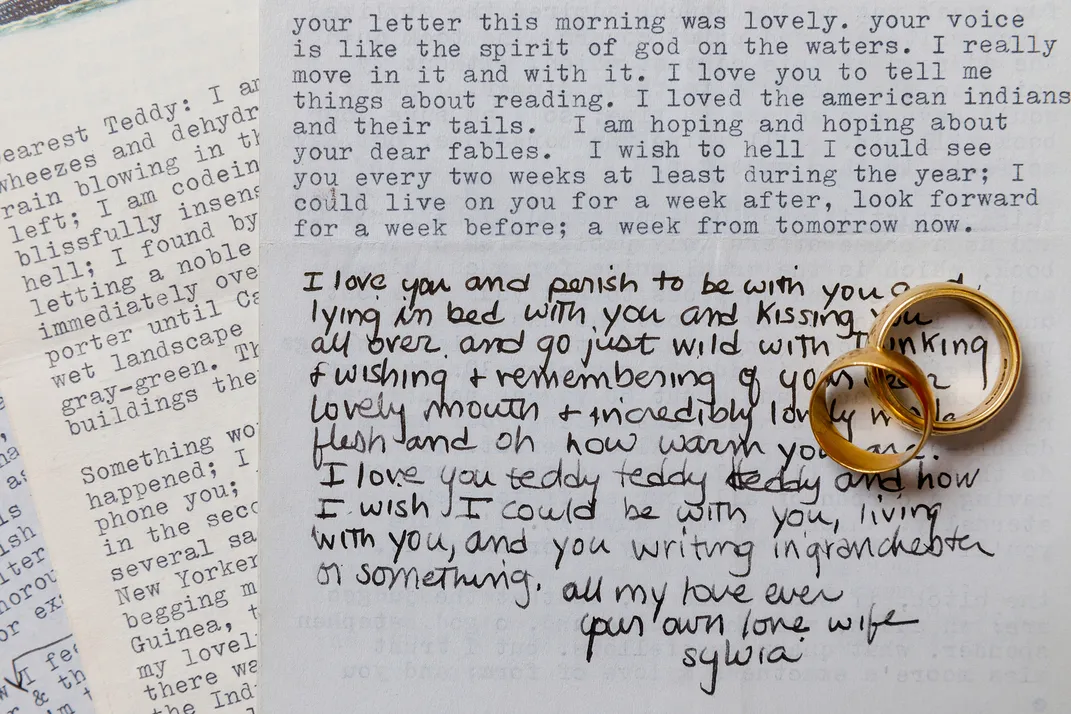Explore Sylvia Plath’s Love Letters, Recipe Cards and Tarot Deck
A trove of the American poet’s personal possessions recently sold at auction for more than $1 million
:focal(744x424:745x425)/https://tf-cmsv2-smithsonianmag-media.s3.amazonaws.com/filer/66/8c/668c4b26-92da-4aad-9a0d-fa7235656878/rolling_pin_and_recipies.jpg)
Personal possessions of the late poet Sylvia Plath, including a rolling pin, wedding bands, recipe cards and love letters, sold at auction last week for a total of more than $1 million.
Auction house Sotheby’s sold the items on behalf of Frieda Hughes, daughter of Plath and her husband, fellow poet Ted Hughes, reports Carlie Porterfield for Forbes. The priciest item sold was a deck of French tarot cards (probably a gift from Ted for Plath’s 24th birthday), which fetched $206,886.
Some of Plath’s works reference tarot. The title of her 1960 poem “The Hanging Man,” for instance, refers to a specific tarot card. As Rebecca Rego Barry writes for Fine Books & Collections, some scholars believe Plath used tarot cards to help organize her semi-autobiographical novel, The Bell Jar (1963), and book of poetry Ariel, which was published posthumously in 1965.
The auction also included numerous letters to Ted, as well as messages written about him to friends. One typed missive sold for more than $40,000.
“My flesh is colder than wet sod,” wrote Plath in an October 1956 letter to Ted. “Do you know that you have the most delicious quirked lovely mouth and your eyes crink up and you are all warm and smooth and elegantly muscled and long-striding and my god I go mad when I let myself think of you.”

Plath and Ted married in 1956—just four months after they met—and went on to have two children. They separated in 1962 after Ted began an affair with Assia Wevill. Plath wrote some of her most famous works in the seven months between their separation and her death by suicide at age 30.
Many of the items sold at the auction date to the early years of the couple’s marriage.
“This auction is really about the happiest and the most dynamic part of my parents’ relationship when they were working at their best together and still very passionately in love and supportive of each other,” says Frieda in a statement. “If you read my mother's letters to my father, their passion and their love is extraordinary.”
The sale also featured artifacts from Plath’s domestic life. Thirty-three of her recipe cards, together with her embossed wooden rolling pin, sold for $27,500, reports Rebecca Rego Barry for Atlas Obscura. Plath’s journals were filled with accounts of her cooking projects, and she frequently entertained guests at her home. Among the recipes included in the worn cards are chicken fricassee, cherry and cottage-cheese cobbler, and “Ted’s mother’s Scots porridge oats biscuits.”
/https://tf-cmsv2-smithsonianmag-media.s3.amazonaws.com/filer/c7/2d/c72dedc0-93d0-4cb1-a9c7-f5aabc517da8/sp-tarot-crop.jpeg)
Peter K. Steinberg, co-editor of The Letters of Sylvia Plath, tells Atlas Obscura that some observers may be surprised to learn that a writer known for penning such lines as “I eat men like air” was determined to be an excellent cook and homemaker.
“She was going to do it all, and she did it really well,” he says.
At the same time, Steinberg adds, the poet warned herself in a 1957 journal entry that “You will escape into domesticity & stifle yourself by falling headfirst into a bowl of cookie batter.”
In recent years, Plath scholars and fans have worked to show the poet, who is often seen through the lens of her tragic death, in a fuller light. The exhibition “One Life: Sylvia Plath,” at the Smithsonian’s National Portrait Gallery, included sketches and writings from Plath’s childhood and conveyed the poet’s ability to shift between serious scholarship and sensual glamour, as Meilan Solly reported for Smithsonian magazine in 2017.
Writer Rebecca Brill has also been bringing a different side of Plath to public notice, posting daily descriptions of meals the poet cooked or ate on Twitter.
“When one thinks of Plath’s kitchen, one conjures up that ghastly image of her gas-oven suicide,” Brill tells Atlas Obscura. “I’m trying to trouble that image by painting Plath’s kitchen as the space of life, joy, and fulfillment it often was for her.”
/https://tf-cmsv2-smithsonianmag-media.s3.amazonaws.com/accounts/headshot/Livia_lg_thumbnail.png)
/https://tf-cmsv2-smithsonianmag-media.s3.amazonaws.com/accounts/headshot/Livia_lg_thumbnail.png)